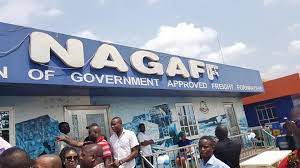The National Association of Government Approved Freight Forwarders (NAGAFF) held a pivotal National Executive Council (NEC) meeting in Apapa, Lagos, themed “A new chapter, a renewed commitment,” marking a crucial juncture in the association’s journey. President Tochukwu Ezisi addressed the gathering, emphasizing the need for reinforced accountability and heightened investment within Nigeria’s maritime sector. He acknowledged the association’s past triumphs in advocacy, professional development, and collaboration with government bodies while also underscoring the importance of addressing internal challenges that could impede future progress. Ezisi stressed the direct correlation between the association’s strength and the financial dedication and active involvement of its members, cautioning against apathy and insufficient investment, which could jeopardize national goals and compromise service delivery.
Dr. Eugene Nweke, a former NAGAFF president and current Head of Research at Sea Empowerment and Research Centre, provided a comprehensive analysis of the transformative changes sweeping the freight forwarding industry. He attributed these shifts to technological advancements, evolving global trade policies, and dynamic consumer behavior. Nweke emphasized the necessity for NAGAFF to reposition itself for sustainable growth and success in this evolving landscape. He highlighted the critical role of effective leadership and strategic planning in navigating these changes, advocating for a clear vision and strategy to propel the association forward.
Nweke outlined a multi-pronged approach to achieving sustainable growth and success for NAGAFF. This includes establishing clear goals and objectives aligned with industry demands, nurturing a culture of innovation and technology adoption, and forging robust relationships with industry stakeholders and government agencies. He emphasized the importance of developing resilience and risk management strategies to mitigate potential challenges. Further, Nweke underscored the need for continuous investment in education and skill development for members to keep pace with the changing demands of the industry. He stressed the significance of equipping members with the knowledge and expertise necessary to navigate the evolving landscape of freight forwarding.
Nweke also advocated for enhancing NAGAFF’s engagement with the broader industry ecosystem. This involves fostering strategic partnerships and collaborations with other key players in the freight forwarding sector. He urged the association to leverage trending Information and Communication Technology (ICT) innovations and applications to streamline operations and improve efficiency. Furthermore, Nweke highlighted the importance of providing ongoing professional development and training opportunities to members, ensuring they remain at the forefront of industry best practices. He encouraged external exchange and expertise programs to facilitate knowledge sharing and collaboration with international counterparts.
The call for stronger accountability translates to a need for greater transparency and responsibility within the association’s operations. This involves ensuring that financial resources are utilized effectively and that members are held accountable for their contributions and participation. Deeper investment in the maritime sector encompasses both financial and intellectual capital. It requires members to commit more resources to the development of infrastructure, technology, and human capital within the industry. This investment is essential for driving innovation, improving efficiency, and enhancing the competitiveness of Nigeria’s maritime sector on the global stage.
The focus on sustainable growth and success underscores the long-term vision for NAGAFF. This involves not only achieving short-term gains but also building a resilient and adaptable organization that can thrive in the face of changing market dynamics. By embracing innovation, fostering collaboration, and investing in its members, NAGAFF aims to secure a prosperous future for the freight forwarding industry in Nigeria, ultimately contributing to the growth and development of the nation’s economy. The association’s commitment to repositioning itself demonstrates its proactive approach to navigating the challenges and opportunities presented by the evolving global trade landscape. The emphasis on strategic planning and effective leadership reinforces the importance of having a clear vision and a well-defined roadmap to guide the association’s future trajectory.














